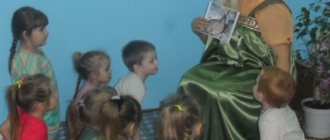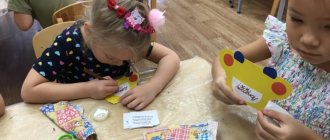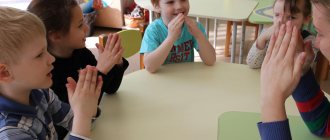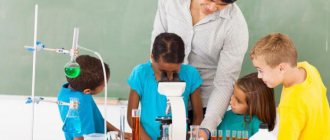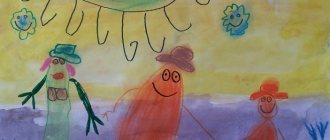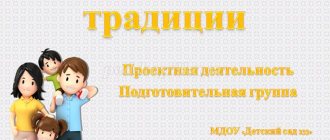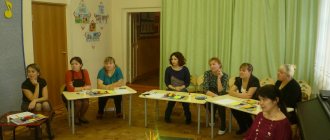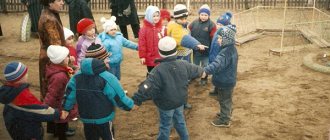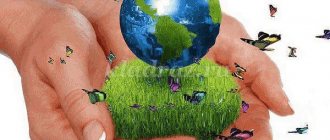Literary holidays
Materials found: 11 Shown: 1 — 10
Literary quiz “Through the pages of your favorite fairy tales”
Goals: summarize and systematize children’s knowledge about fairy tales, develop interest in reading fiction. literature, to cultivate a kind attitude towards people, to bring joy to children. Equipment: illustrations from fairy tales, object pictures...
KVN "Visiting a fairy tale"
KVN "Visiting a fairy tale." Objectives: Teach to love a fairy tale and show interest in it. Summarize children's knowledge on the topic "Fairy Tale". Evoke positive emotions, develop fantasy and imagination. Strengthen the ability to compare,...
Leisure in the preparatory group for S. Yesenin’s birthday
Goal: fostering love for the Motherland, Russian nature through the poetry of Sergei Yesenin. Objectives: 1. To develop children's interest in Russian poetry. 2. Teach children to hear the beauty of their native word. 3. Nurture emotional…
Quiz based on the fairy tales of K. Chukovsky
Goals: To help children remember the names and content of K. Chukovsky’s fairy tales. Introduce the biography of the writer. Develop coherent speech skills. Learn to expressively convey the dialogues of fairy tale characters together with the teacher. ...
Thematic leisure scenario “Journey through the fairy tales of A. S. Pushkin” (for middle preschool age)
Goal: instilling a love for works of Russian literature; Objectives: to cultivate sensitivity to the artistic word; consolidate and expand children's knowledge about the works of A. S. Pushkin; develop imagination and creative thinking. ...
Literary entertainment based on the fairy tales of K. I. Chukovsky
Literary entertainment based on the fairy tales of K. I. Chukovsky. Goals. To consolidate children's understanding of the fairy tales of K.I. Chukovsky. Maintain children's interest in familiar literary works. Objectives: To develop children's attention,...
Summary of entertainment for the birthday of A. S. Pushkin “Visiting a fairy tale”
Goal: To form children’s knowledge about the fairy tales of A. S. Pushkin. Improve children's speech activity. Objectives: Create an emotionally positive environment and form friendly relationships; Consolidate children’s knowledge about...
Literary quiz for junior group 2
The lesson on cognitive development was prepared and conducted by teacher Natalya Nikolaevna Anisimova. 2nd junior group. Literary quiz. Objectives: Remind children of the names and contents of some works, ...
Literary and musical composition “Forests dressed in brocade and gold”
Educational goals Speech development: - generalize children’s ideas about autumn, autumn changes in nature; - consolidate children’s knowledge of the autumn months, the ability to determine the month by signs; - activate children's vocabulary,...
Literary quiz for older children “Visiting a fairy tale”
Books are beautifully laid out in the group, including Russian folk tales and fairy tales by various authors in bright bindings.
Educator: Look, our books are different, the books are just super cool, different fairy tales live in books, people are kind and joyful... Pages:
All sections
Literary evenings of leisure and matinees in kindergarten. Types and content, methodology.
The literary development of children is facilitated by matinees, leisure evenings dedicated to the work of a writer or poet, evenings of fairy tales, riddles, literary quizzes (on folk tales, on the works of one author, on well-known books by different writers). The combination of different types of arts - music, fiction, visual arts - creates a festive atmosphere.
This is a group of methods and means of using literature outside of class, where works of art are presented both in unadapted form and in the form of adaptations and dramatizations.
Literary evenings of leisure
contribute to the deepening of acquired skills, increase interest and love for works of folk art and writers, give novelty to the impression, and create a joyful mood.
Literary holidays consolidate and generalize the diverse artistic impressions, knowledge and skills of children; they include different types of children's activities:
- reading and storytelling;
- singing and dancing;
- hearing;
- screenings and performances.
On holidays of a domestic nature
(birthday party, evening of entertainment) children can perform
a retelling of prose works
, including a retelling in parts. It should be noted that in the practice of kindergartens at holidays, prose sounds clearly insufficient. For some holidays in older groups (fairy tale day, spring and summer holidays, bird day, etc.), it is recommended to select works of various genres: poems, riddles, stories, excerpts from fairy tales, as well as proverbs and sayings that the presenter will use in the appropriate situation.
In pre-school groups
unique forms of work with fiction are used:
literary matinees
and
amateur literary concerts
not only for children of six or seven years old, but also for younger ones.
The matinee can be dedicated to the anniversary or the work of a writer beloved by children
. The theme of the matinee could be: “Russian folk tales”, “Poems of poets for children”, “Foreign fairy tales”, etc.
The structure of the matinee has much in common with the structure of any holiday
: grand opening, opening speech by the presenter (in this case it may be more detailed), inspection of the festive decorations, exhibitions, concert numbers, interconnected by explanations and stories of the presenter, which should be interesting and accessible to children.
You can invite the children of the older group to the second half of the matinee (after the intermission), in conclusion, present memorable gifts to everyone present, look at the exhibition in more detail (give the children the opportunity to approach the stand, take a book, etc.).
Children aged six or seven
concerts for children
on their own . It is advisable for seniors to be entrusted with the role of organizers and presenters. They draw up the program themselves, assign roles, conduct rehearsals, and prepare the premises. This concert lasts 10-15 minutes. Its program can be very diverse: reading nursery rhymes and poems known to younger children (preferably using visual material - toys, objects, pictures), retelling a fairy tale familiar to the “guests”, reading new poems or nursery rhymes for children, a table theater of fairy tales, a dramatization game or puppet theater. Children leading the concert can invite small spectators to perform (optional) reading poetry, uttering onomatopoeia in chorus, etc.
To spectacular types of entertainment
include
performances, theatrical performances, concerts
, which are carried out
by adults, schoolchildren (or older kindergarten students).
It is advisable to introduce older preschoolers to professional performing arts: the teacher should recommend that parents attend children's performances in drama and puppet theaters with their children.
In kindergarten, you can organize viewing of dramatizations of works, methodically correctly preparing children for it. Many works of art have been staged for preschoolers through cinema (cartoons, films). For example, “The Tale of the Military Secret...” by A. Gaidar was repeatedly filmed, cartoons were created based on the works “Moidodyr” by K. Chukovsky, “Mustachioed and Striped” by S. Marshak, etc.
In the method of showing cartoons (it is most often found in kindergartens), preliminary preparation of children for viewing is important: reading a filmed fairy tale or another work similar in theme, looking at pictures that are similar in content to the film, talking with children. This work is carried out several days before the show. Before showing the cartoon, it is advisable to have an introductory speech from the teacher.
The effectiveness of the spectacle will be higher if the teacher consolidates the impressions received in the process of drawing, modeling, playing, talking, etc.
Each teacher must master the technique and methodology of showing films and theater performances to children, have a firm grasp of the hygienic standards of their performance (duration, seating of children), and follow safety rules.
Theatrical performances and films can be shown in the hall, in group rooms, in the summer on the site, sometimes bringing together groups of the same age. Depending on the latter, the display time is also set. In different groups, it is better to conduct it within one or two days in order to save time on setting up the screen, screen, and preparing props.
Children become familiar with dramatizations by also listening to recordings. Perceiving a dramatization by ear is more difficult. It requires preparatory work (introduction, reminder, etc.).
Currently, preschoolers are widely exposed to literary art through television.
We will help you write any paper on a similar topic.
- Essay
Literary evenings of leisure and matinees in kindergarten. Types and content, methodology.
From 250 rub.
- Test
Literary evenings of leisure and matinees in kindergarten. Types and content, methodology.
From 250 rub.
- Course work
Literary evenings of leisure and matinees in kindergarten. Types and content, methodology.
From 700 rub.
Receive completed work or specialist advice on your educational project
Find out the cost
MAGAZINE Preschooler.RF
Literary and speech activities in our kindergarten.Literary and speech activities in our kindergarten are held in all age groups. They are held once a month in the afternoon.
“Rhetoric + Theater” has been created on the basis of our kindergarten ; the pupils of this circle perform theatrical performances for children of younger groups. Based on Russian folk tales. “Kolobok” , “Teremok” , “Turnip” etc. T. P
Starting from the middle group, we use literary and speech leisure in the form of a quest game. Such as “Miracles in a fairy tale land” , “On the roads of fairy tales” , “Let's help the heroes from a fairy tale”
Also, during literary and speech leisure, children, together with their parents and kindergarten teachers, develop newspapers; the pupils really loved making baby books in our kindergarten. After all, this interesting activity captivates all kindergarten students. Pupils of older groups make words from letters and paste them into a little book. They independently design the publication, draw fairy tale characters, come up with continuations of fairy tales, or invent their own fairy tales.
Literary and speech leisure activities evaluate the speech development of children, to understand how all mental processes are activated, how moral qualities are formed, how cognitive processes, creativity, and intelligence of the child develop.
Also in our work we use a variety of tasks that we use in our work, for example: “Find out a fairy tale or story by a passage, illustration, objects, by a character in a story or fairy tale. “How do fairy tales differ from other literary works ? “What proverbs are found in fairy tales”
Our kindergarten also hosts speech festivals; we dedicate them to the work of children's writers. Speech festivals unite different types of arts - painting, literature, music.
In our kindergarten there are a lot of scenarios for such holidays. “My favorite toys” (based on the work of A. Barto), “Living Hat” (based on the work of N. Nosov), the holiday of “True Friends” , the holiday of “Russian folk tales” .
The main task of our holidays is to improve the speech of preschoolers and develop creative abilities.
Our students love to take part in preparations for the holidays. Pupils show great interest in acting out skits and love to recite poems. They take great pleasure in making up fairy tales.
Also in our kindergarten there are intellectual and speech games in the form of quizzes, competitions, tournaments, and Olympiads.
We also have original leisure scenarios for pupils of the preparatory school group “Magic Country” , “On the Path to Fairy-tale Heroes” .
After all, such games are important for the development of a preschooler’s intelligence. We hold intellectual competitions between pupils of children of the same age, as well as between kindergartens.
In our kindergarten we attach special importance to holidays with the participation of parents and children. We have a lot of holidays with our parents, for example: “Mom’s Tales” , “In the Country of Summer Residents and Gardeners” , “Chocolate Day” , “Mom Dad I’m My Friendly Family” . Holidays with the participation of parents show that there is an atmosphere of mutual understanding, joint creativity, and friendship.
Our creative work helped develop preschoolers’ motivation for knowledge and creativity, and the formation of a positive image. We have created all the necessary conditions for meaningful leisure time for children in kindergarten, and the role of parents in the upbringing and development of preschoolers has increased significantly.
| Next > |
